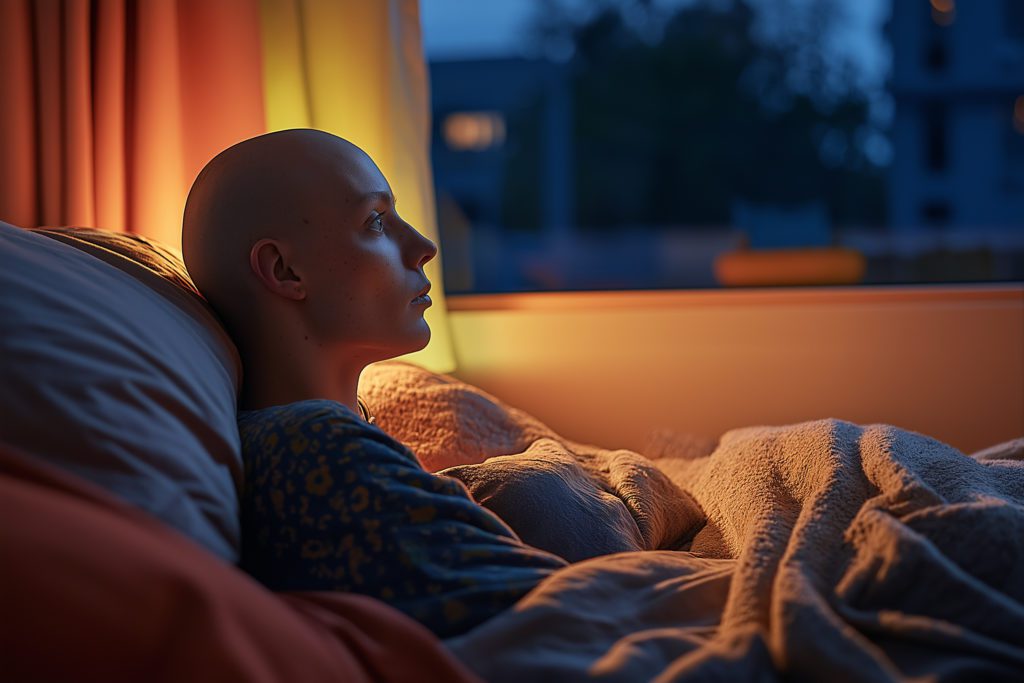
Cough-Induced Insomnia: How Persistent Cough Can Lead to Sleepless Nights
Discover how chronic coughing impacts your sleep. Learn causes, effects, and the best strategies to manage cough-induced insomnia for restful nights.

How often have you woken up with a cough or struggled to sleep due to a cough that just wouldn’t go away? As one of the most common complaints in virtually any setting today, coughs are stubborn issues that can have an impact not only on our health but also on our overall sleep. You likely have already felt the effects of lost sleep, but what really causes cough-induced insomnia, and how can we manage the symptoms we experience?
If you’re curious to learn more, read on! We’ll discuss cough-induced insomnia, its causes, how it impacts your health and sleep, and some strategies to cope with it. By the time you finish reading this article, you’ll be equipped with all the tools and knowledge you need to reclaim your sleep and get back to restful nights.
Understanding Cough-Induced Insomnia: What It Is and Its Symptoms
Insomnia is a well-known sleep disorder, but cough-induced insomnia is becoming more readily discussed in current literature. This type of insomnia is characterized by a persistent cough that lasts longer than a few weeks—making it a chronic issue—that causes your lack of sleep. Coughing doesn’t just affect your ability to rest, but it can also impact your cardiovascular system, nervous system, and even your gastrointestinal tract (Source: PubMed).
The causes of coughs range from viruses to pollutants in the air to medical conditions, such as asthma, chronic obstructive pulmonary disease (COPD), gastrointestinal disease (GERD), or other infections. In fact, the largest group of individuals diagnosed with chronic coughing are those with asthma or COPD (Source: PubMed). Allergens may also cause coughing and air quality, but regardless of the cause, cough-induced insomnia affects your sleep and overall health in distinct ways.
How a Persistent Cough Can Lead to Sleepless Nights and Poor Health
As you can imagine, persistent coughing can lead to sleepless nights and poorer well-being for reasons that have been illustrated in many studies by experts. One of the most common reasons why coughing can lead to sleepless nights is because it is not possible to cough during REM sleep. Studies have confirmed that coughing only happens when you’re conscious, not asleep, so every time you cough, you wake up and lose out on precious rest (Source: PubMed).
So, to put it plainly, coughing wakes you up and disturbs your sleep, so you spend a good portion of the night awake. And, as you might have guessed, the less that you sleep, the more insomnia-like symptoms you experience. Because of that, you are more likely to struggle with health problems, even mental health conditions.
Chronic coughing is common in patients who have anxiety, insomnia, social dysfunction, and even depression. But this all makes sense when you look at the data regarding insomnia, as people who have been diagnosed with this disorder tend to be more likely to struggle with mental health conditions like anxiety, depression, or even social dysfunction.
When you combine all of these effects, chronic coughing limits your sleep, which can hurt your immune system and your mental health. All in all, one sleepless night after another can lead to even worse health conditions down the road. But how do you stop the long-term impacts or at least lessen them? Fortunately, experts have some tips to guide you to better health and well-being.
The Best Strategies to Manage Cough-Induced Insomnia
If you’re looking for some help to avoid insomnia and to get better rest—while alleviating your coughing fits—then you have to know the best strategies currently being used. Here are some methods we recommend you try.
- Stay Hydrated: One of the unknown issues many people with chronic coughs or asthma struggle with is dehydration. If you ensure you get enough water throughout the day, you can lower the number of coughing fits you have and reduce the irritation in your throat that could be causing these concerns, even overnight, while you attempt to rest (Source: PubMed).
- Try a Humidifier: In some cases, you may be living in an area where it is simply too dry for you, leading to persistent coughing and insomnia-like symptoms. For instance, when humidifiers were used on those with colds, their symptoms were relieved, and they were able to reduce their coughing and congestion. So, it might be worth a try if you struggle with chronic congestion or coughing at night.
- Sleep in an Elevated Position: This is especially helpful for those who may have GERD, as this can increase the chance of coughing and reduce your ability to sleep. Many experts agree that those with GERD should not sleep on their right side, but sleeping elevated can bring them relief and help them sleep more soundly.
- Pulmonary Rehabilitation: For those who have COPD or other conditions like asthma, pulmonary rehabilitation can be a great tool to support your lung health. Over two months, many patients have reported improved psychological well-being and health factors, as well as an increased ability to exercise.
- Lifestyle Changes: As with any health condition, lifestyle changes can help you a ton. That means trying to reduce the allergens in your home, promoting better sleep hygiene, and also making dietary adjustments. Quitting smoking reduces GERD and coughing at night, just like eating a healthy diet and drinking plenty of water, which will also benefit your overall health.
- Over-the-Counter Medication: One of the most important steps if you feel you have cough-induced insomnia is to visit your primary care provider to explore steps for pharmaceutical interventions. If you have tried absolutely everything and still can’t kick that cough, it’s time to see if medicine might help you control that cough.
Take Steps to Protect Your Sleep and Reduce Coughing at Night
Cough-induced insomnia is no joke, but with an understanding of what it is and how it is caused, you can protect your sleep and reduce your symptoms. If you feel as though no strategy you’ve tried has worked, it’s best to contact your healthcare provider to see what they recommend for getting better sleep at night. We hope that this article taught you something new! What will you do to enhance your rest in the future?
FAQ
Can certain medications contribute to cough-induced insomnia?
Yes, medications like ACE inhibitors for hypertension can trigger a persistent dry cough, disrupting sleep. Other drugs, such as beta-blockers and some NSAIDs, may also irritate airways or increase mucus production, worsening nighttime coughing and leading to sleep disturbances.
How does the body's circadian rhythm influence cough severity at night?
The circadian rhythm affects immune responses and airway function. At night, increased histamine levels and airway narrowing can make coughing worse. Additionally, lying down can lead to mucus accumulation, further aggravating nighttime cough and making it harder to sleep.
Can psychological factors like stress and anxiety worsen cough-induced insomnia?
Yes, stress and anxiety can heighten sensitivity to cough triggers and make it harder to relax and fall asleep. Anxiety can lead to muscle tension and increased breathing effort, aggravating airway irritation and making nighttime coughing more pronounced and persistent
Can hydration levels impact the severity of nighttime coughing?
Yes, dehydration can lead to dry throat tissues, thickened mucus, and increased irritation, making nighttime coughing worse. Drinking enough water throughout the day helps keep airways moist, reducing throat irritation and the frequency of coughing fits during sleep.
Are there any natural remedies that can help with cough-induced insomnia?
Natural remedies such as honey, herbal teas (like chamomile or ginger), and steam inhalation can soothe throat irritation and help reduce coughing. Additionally, using essential oils like eucalyptus or peppermint may provide relief by opening airways and promoting relaxation.
How does sleep apnea interact with chronic coughing?
People with sleep apnea may experience worsened coughing due to airway obstruction and irritation caused by mouth breathing. The constant pressure from CPAP machines can also dry out airways, potentially triggering more frequent coughing episodes at night.

Written by
Marie Soukup
Marie Soukup is a seasoned copywriter, editor, and Integrative Nutrition Health Coach with a certificate from the Institute of Integrative Nutrition (IIN). With years of experience working with brands across diverse industries, Marie is passionate about holistic health and crafting compelling content.
Download Pillow
Get help
Press & News
Legal
Connect
X (Twitter)
Company
Copyright © Neybox Digital Ltd.



